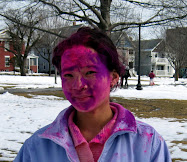Economic recession makes life harder for refugees

Photo by Mike Greenlar
Bhutanese refugees Chali Wagle 19, her father, Karna Wagle (right) and neighbor Gopi Neopane (left), meet with Jasenko Mondom, a job developer at the Refugee Assistance Program on Park Street. in Syracuse. Everyone laughed when Mondom asked if Karna was strong and healthy enough for a construction job. Karna responded that he had done that kind of work before in Nepal.
Syracuse, NY.-----
Read my story in Monday's Post-Standard about how the economic recession is affecting refugees. Many of the nearly 1,000 refugees who settled in the Syracuse area in the last year are having a tough time finding work.
Jasenko Mondom, a job developer at the Syracuse school district's Refugee Family program on Park Street, remembers when employers used to call him every day looking for refugees to fill entry-level positions at local factories. These days those jobs are hard to come by because factories are closing, reducing hours and laying off workers, he said.
Refugee resettlement agencies receive funding from the federal government that requires them to put refugees to work within the first four months of their arrival. But Jasenko and others say they're having a hard time meeting that deadline because of the economy. Refugee resettlement agencies nationwide are experiencing the same problem.
With the loss of manufacturing jobs, refugee agencies are looking at other areas of the economy-seasonal agricultural jobs, retail health care and house-keeping as well as enrolling refugees in job-training programs.
"We're looking at any kind of market outside the factories that we've gone to,'' said Felicia Castricone, executive director of Northside CYO, the Catholic Charities agency that runs the refugee program.
Last year,
Catholic Charities of Onondaga County placed more than 50 refugees at Plainville Turkey Farms, now known as
Kosher Valley. When the company changed management, 57 refugees were laid off, said Harvey Pinyoun, a caseworker and volunteer coordinator. Nine of those workers were called back, he said. The agency also placed workers at
Beak & Skiff, an apple orchard in Lafayette.

Photo by Mike Greenlar /The Post-Standard
Catholic Charities Refugee Resettlement Services caseworker Harvey Pinyoun(left)assists Burundi refugee Jean Baptiste in finding employment, at CYO on North Salina St. He was recently laid off from the former Plainville Turkey Farms, now Kosher Valley.
The Refugee Family Program has enrolled Bhutanese refugees in certified nursing assistant programs at
James Square Nursing Home and Iroquis Nursing Home, Jasenko said. Some refugees are also enrolled in the Northside Green Train, a new initiative developed by the
Northside Collaborative to offer basic construction and weatherization training for neighborhood residents.
Assemblyman Bill Magnarelli secured funding for the 12-week program, which seeks to help residents find jobs, said Dominic Robinson, the collaborative's program director. Thirteen of the 15 participants are refugees, he said.
"We're working with refugees because clearly there's huge population on the North Side,'' he said. "About 300 families a year come to our neighborhood through the refugee resettlement agencies. We wanted to target them initially just because we have good relationship with the agencies, and it's an easy pipeline.''
Refugee resettlement agencies are also working with refugees who have been laid off from jobs they've had for years. Refugees are competing with American workers for the limited number of jobs that anybody will be eager to take in this economy.
Some refugees moved here from other states, hoping to find work, but found the same challenges. The lines are long at all three refugee agencies. Most people come looking for job leads or need help filing for unemployment benefits and other social services.
"People who are used to working, they don't want to be on the dole,'' said Matt Centore, a job developer at the refugee center on Park Street.
Chali Wagle, 19, a refugee from Bhutan, showed up at the center on a recent Monday with her father, Karna, 43 and their neighbor, Gopi Neopane, 40.
Gopi was a seamstress in Nepal. She made clothes and sold them in the market. She's hoping to find work using her sewing skills. Karna has some experience in construction. He went to several construction sites where other Bhutanese refugees worked, but no one was hiring, he said.
Chali said her parents have been looking for work since they settled here in September. She finished 10th grade in Nepal, but Chali said she wants to find a job.
"I'm looking for any sort of job I can do,'' she said. "I feel bad I can't find work.''
After fleeing civil war, economic and social injustices in their homelands, most refugees are eager to find jobs so they can take care of their families and pursue the American dream. While they are safe and free, refugees are concerned about their financial future.Jean Baptiste, 35, a refugee from Congo, lost his job at Marquardt Corporation in Cazenovia in December. He's been looking for a job since then because it's hard to support his wife, Maria and their 6-year-old daughter, Agnes on the $180 he receives every week from unemployment."I can't pay all the bills," he said. "It's too difficult to find any job because too many companies, no work. If you not work, it's not a good feeling. It's too bad."
Jean story was echoed by the dozens of refugees I interviewed for this story. During a recent visit to Catholic Charities' refugee center on North Salina Street, I found six Bhutanese refugees using the computers in the job development office to fill out online applications for housekeeping and food service positions at
St. Joseph Hospital Health Center. Five of the six refugees have bachelor's degrees, but they'll take any job.

photo by Mike Greenlar /The Post-Standard
Catholic Charities Refugee Resettlement Services caseworker John Miller Jr. lower left, works on his computer at CYO on N. Salina St., with an office full of college educated Bhutanese refugees, looking for local employment. Front L to R Prakash Kharel and Kumari Pokhrel, back standing Megh Powdyal, sitting Bhim Basnet. The three men have college degrees in Nepal, Kumari did not finish her degree. Miller specializes in refugee employment.
Prakash Kharel, 28, was one of them. Prakash settled in Syracuse two months ago with his wife
and their two children, ages 4 and 8. "I'm just looking for any kind of entry-level job,'' he said. "I just want to get a job now.''
John Miller, a
FrancisCorps volunteer at the refugee program, has been helping refugees find work. He helps them fill out applications, takes them on interviews and talks to employers. Some refugees, he said, have found jobs on their home at local hotels and retail stores. John is leaving in August to start medical school, but he's concerned about the refugees. The job market is challenging, but the refugees need a lot of support because of what they've been through to get to America, he said."We are a nation of immigrants,'' he said.













